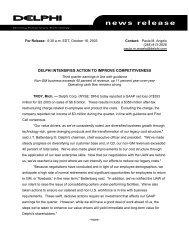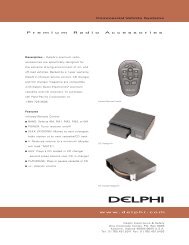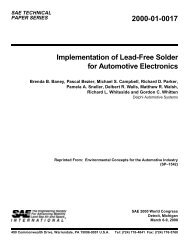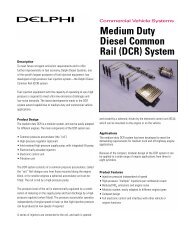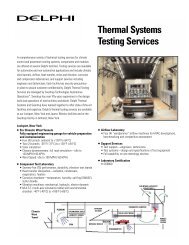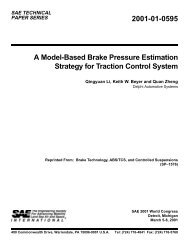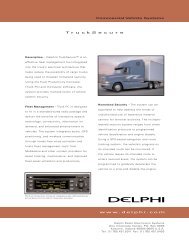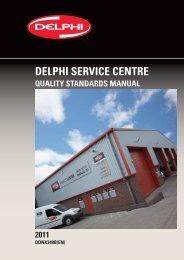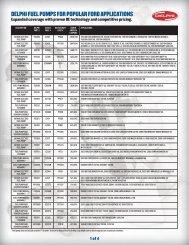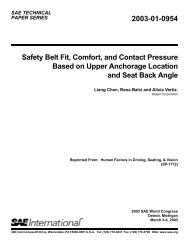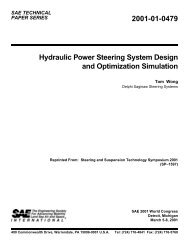2000-01-0132 Integrated Motor Drive Unit A Mechatronics ... - Delphi
2000-01-0132 Integrated Motor Drive Unit A Mechatronics ... - Delphi
2000-01-0132 Integrated Motor Drive Unit A Mechatronics ... - Delphi
Create successful ePaper yourself
Turn your PDF publications into a flip-book with our unique Google optimized e-Paper software.
with the 2D model results. The FET's used in this application<br />
can not exceed 175°C. A 3D model is necessary to<br />
assess if this condition can be met.<br />
2<br />
0.18<br />
0.18<br />
Dielectric<br />
Mg<br />
Figure 7. 3D Model Dimensions<br />
The temperature of the silicon in the one mm thick copper<br />
model reached 174°C. When the copper layer is<br />
increased to two mm thick the temperature is reduced by<br />
seven degrees. Obviously the goal of keeping the temperature<br />
of the silicon below 175°C can be achieved with<br />
this design concept.<br />
THE NATURE OF MECHATRONIC DESIGN<br />
Cu<br />
Al<br />
The design of most complex systems is achieved by<br />
breaking the various parts into pieces that can be<br />
designed independently. The design of each sub part<br />
may be completed by an individual working on each part<br />
in series, or by several teams that complete the parts in<br />
parallel. When the design of all the sub parts is completed<br />
they are combined together to make a complete<br />
system.<br />
Highly integrated designs, such as the one presented<br />
here, make dividing up the design into sub parts very difficult.<br />
Each and every part becomes highly dependent on<br />
the others. Members of the design team may no longer<br />
work independently, and everyone working on the project<br />
must have a strong understanding of the entire system.<br />
The challenges to integration extend beyond the design<br />
process. Electric motors and their controllers are often<br />
produced in separate manufacturing facilities. Sometimes,<br />
different corporations may even produce the two<br />
parts. Because of the high integration achieved in<br />
designs such as this one it becomes necessary to combine<br />
the manufacturing operations. Often the manufactur-<br />
Si<br />
5.842<br />
Solder<br />
0.63<br />
0.1<br />
20<br />
2<br />
4.318<br />
1-2<br />
4<br />
ing processes are not compatible with each other. For<br />
example, motors require heavy metal working operations<br />
that are inherently dirty, but electronics requires a very<br />
clean environment.<br />
Highly integrated designs can be extremely sensitive to<br />
changes in requirements. For example, suppose the<br />
torque output requirement for this motor was increased<br />
by 50 percent. This would require an increase in current<br />
through the motor. This would necessitate doubling the<br />
number of silicon devices to handle the current. Because<br />
there is no more room for these devices the whole design<br />
concept would require re-evaluation. A less integrated<br />
design would likely be more easily adapted to such<br />
changes.<br />
Highly integrated designs have many potential advantages,<br />
but they must be weighed against the added complexities<br />
during design and manufacturing.<br />
CONCLUSION<br />
This design achieves a tight integration between an electric<br />
motor and its controller. This results in a very small<br />
system package. Problems associated with interconnecting<br />
wires are minimized. The viability of the novel thermal<br />
management approach is shown through finite element<br />
analysis.<br />
CONTACT<br />
Jeffrey H. Burns<br />
Advanced Project Engineer<br />
Advanced Engineering<br />
Delco Electonics Systems<br />
World Headquarters<br />
M/C D28<br />
One Corporate Center<br />
P.O. Box 9005<br />
Kokomo, Indiana<br />
46904-9005 USA<br />
Tel: 765.451.3279<br />
Fax: 765.451.3600<br />
Email: Jeff.H.Burns@delphiauto.com<br />
Suresh K. Chengalva<br />
Project Engineer<br />
Advanced Engineering<br />
Delco Electonics Systems<br />
World Headquarters<br />
M/C D28<br />
One Corporate Center<br />
P.O. Box 9005<br />
Kokomo, Indiana<br />
46904-9005 USA<br />
Tel: 765.451.3278<br />
Fax: 765.451.3600<br />
Email: Suresh.K.Chengalva@delphiauto.com



